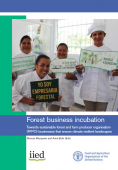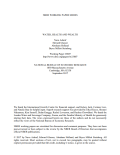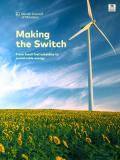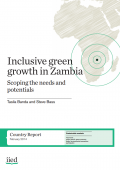Informal economic activities across much of sub-Saharan Africa provide crucial cash income and employment for both rural and urban populations. Governing the informal economy is recognised as a key policy challenge due to its contribution to local livelihoods and its common association with illegality, tax evasion and negative environmental impacts. In addition, because of the increasingly globalised trade in commodities, parts of the informal economy can also be supported by global sources of capital. This ‘globalised’ rural informal economy urgently calls for innovative policies, which maximise the benefits of global capital flowing directly to rural populations, while minimising the negative impacts associated with the environment, revenue losses and resource governance.

Forest business incubation is a support process that accelerates the successful development of sustainable businesses in forest landscapes. There is much to develop. The aggregate gross annual value from smallholder producers within forest landscapes may be as much as US$1.3 trillion.
Forest Business Incubation: Towards Sustainable Forest and Farm Producer Organisation (FFPO) Businesses that Ensure Climate Resilient Landscapes demonstrates how to overcome business incubation challenges in remote forest landscapes. These may include low densities of educated entrepreneurs, high logistical costs, scarce infrastructure to differentiate products, and few capable business mentors. The book includes an introduction to the forest business incubation service delivery model, detailed case studies are presented of attempts to deliver business incubation services in forest landscapes, an analysis of the data presented by the case studies and some observations and conclusions about how best to develop forest business incubation in the service of both forests and people.


This report estimates fossil fuel subsidies to be around USD 425 billion. Such subsidies represent the large lost opportunities for governments to invest in renewable energy, energy efficiency and sustainable development. Removal of subsidies can lead to carbon emission reductions (6~8% by 2050 globally), Reductions that can be improved further with a switch or a "SWAP" towards sustainable energy.
This report describes the scale and impact of fossil fuel subsidies on sustainable development. It describes the SWAP concept to switch savings made from fossil fuel subsidy reform, towards sustainable energy, energy efficiency and safety nets. The report provides potential SWAP outlines for Bangladesh, Indonesia, Morocco and Zambia. "Making the Switch" was written for the Nordic Council Ministers by the Global Subsidies Initiative of IISD and Gaia Consulting.

Many countries are exploring their prospects for green growth. It has become a hot topic, proving attractive to governments, companies, and civil society groups alike. The 2012 Rio+20 Summit concluded that green growth is best defined and tailored according to the individual country context. This report describes Zambia’s approach to develop a Zambian Inclusive Green Growth Strategy under its Sixth National Development Plan.
The Zambian definition for inclusive green growth, is ‘inclusive development that makes sustainable and equitable use of Zambia’s natural resources within ecological limits’. The report describes the changing international policy and financial context for inclusive green growth, reports on a workshop facilitated by IIED, and proposes initial steps to develop its operational Strategy.
